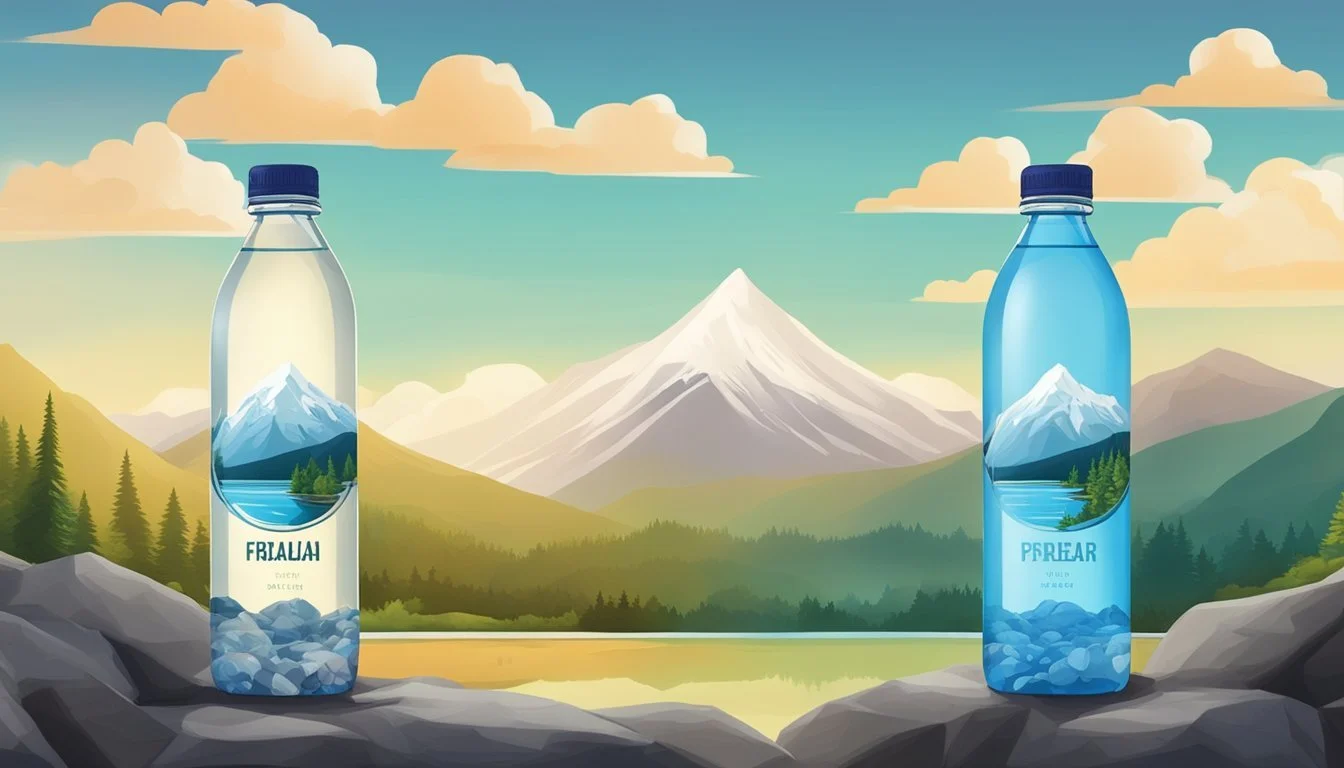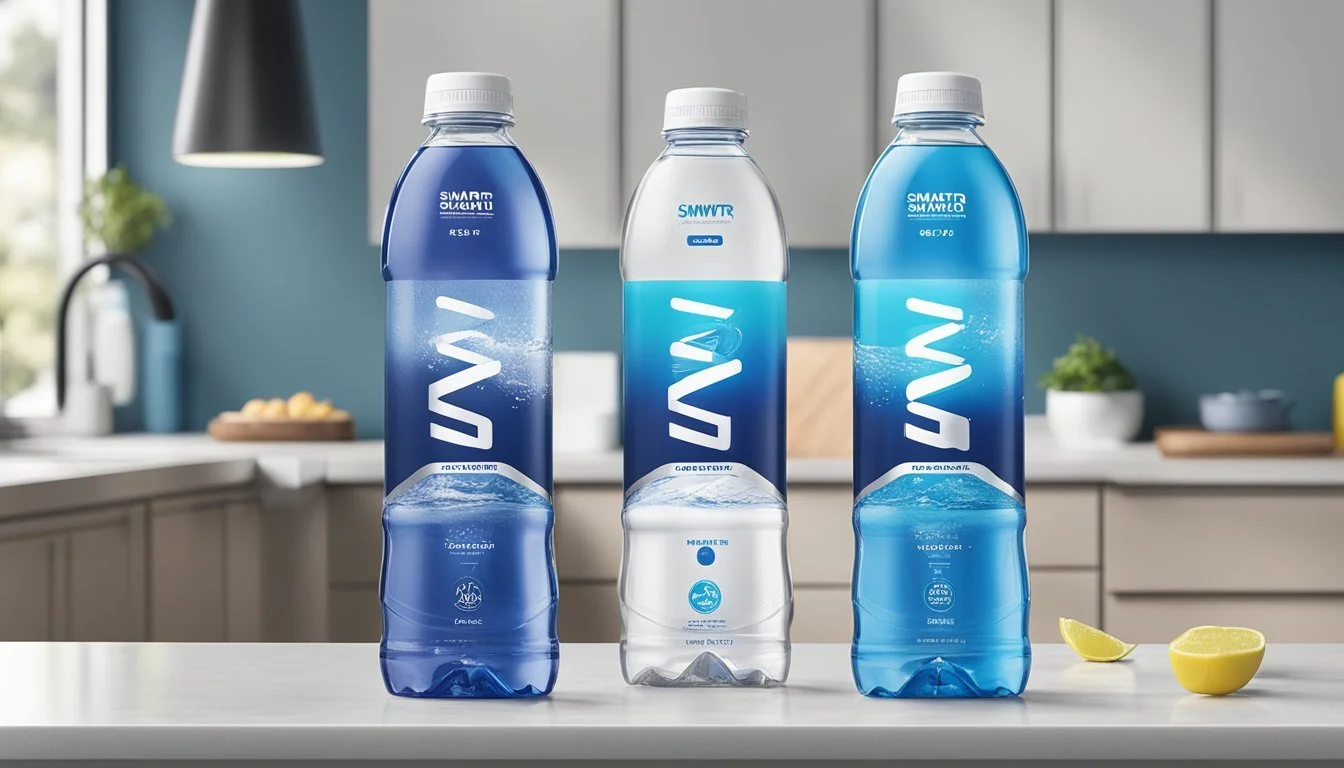Smartwater vs. Zenwtr
Ultimate Bottled Water Comparison
When it comes to choosing between Smartwater and ZenWTR, consumers often find themselves weighing the merits of each brand. Both waters fall into the premium category, offering more than just hydration. Smartwater is known for its vapor-distilled purification process and added electrolytes, which many claim enhances taste and replenishment.
On the other hand, ZenWTR boasts a natural alkalinity with a pH level that balances naturally, setting it apart from other alkaline waters that use artificial additives. If you prioritize natural alkalinity and environmental benefits, ZenWTR may be the superior choice.
Ultimately, the decision between Smartwater and ZenWTR boils down to personal preference and specific needs. Whether it's the taste clarity offered by Smartwater or the natural properties of ZenWTR, both brands have their distinct advantages, making either a viable option for the discerning consumer.
Understanding Bottled Water
Bottled water is a convenient option for those seeking hydration on the go. It's important to understand the different types of bottled water available.
Purified water is the most common type, undergoing processes like reverse osmosis or distillation to remove impurities and contaminants.
Mineral water is sourced from natural springs and contains varying levels of minerals and electrolytes, beneficial for health.
Bottled water comes with different levels of pH balance. For instance, some brands, like Smartwater Alkaline, offer water with a higher pH, which is said to benefit the body by neutralizing acidity.
Plastic bottles are a common issue due to their environmental impact. Brands like ZenWTR aim to use recycled plastics to mitigate this concern.
The mineral content and electrolytes vary between brands. These components can enhance the taste and provide additional nutrients.
Filtration methods play a crucial role in determining water quality. Techniques like reverse osmosis ensure the removal of metals and other contaminants, providing a cleaner product.
Natural water sources, such as spring or artesian wells, often boast higher mineral content and natural purity, distinguishing them from other types.
BPA-free packaging is another important consideration, as it reduces the risk of exposing consumers to potentially harmful chemicals in plastic.
The FDA regulates bottled water to ensure safety and quality. Understanding these regulations can help consumers make informed choices.
Finally, the sustainability of the production process and packaging is crucial. Brands with eco-friendly practices are preferable for reducing environmental impact.
Brand Profiles
Both Smartwater and Zenwtr are prominent brands in the bottled water market, each with unique attributes. This section explores their key features, including production processes, sources, and environmental commitments.
Smartwater
Smartwater, a product of Coca-Cola, stands out for its vapor-distilled water. The water undergoes a vapor distillation process where it is evaporated and then condensed, ensuring purity and a crisp taste.
The brand is known for its clean and fresh profile, which is attributed to the distillation process. Minerals like calcium, magnesium, and potassium are added to enhance the flavor.
Smartwater is often marketed as premium bottled water. The bottle design is sleek and modern, adding to its appeal. While Smartwater does not emphasize environmental initiatives as much as some competitors, its product remains a popular choice for its taste and purity.
Zenwtr
Zenwtr differentiates itself with its environmental commitment and naturally alkaline properties. Made from recycled ocean plastic, the brand emphasizes sustainability. The pH level of Zenwtr is naturally balanced, which is a significant selling point compared to other alkaline waters that may use artificial additives.
Zenwtr is particularly known for its eco-friendly packaging, contributing to reducing ocean plastic waste. The brand's mission is not just to provide high-quality water but to support environmental conservation efforts actively.
Zenwtr's focus on natural alkalinity and its unique initiative to use recycled materials make it an appealing choice for environmentally conscious consumers. The water's taste and health benefits further solidify its position in the premium bottled water market.
Health and Hydration Benefits
Smartwater and ZenWTR both aim to provide enhanced hydration, but they have unique features.
Hydration: Smartwater is vapor distilled, making it a pure and clean option for hydration. ZenWTR, on the other hand, is alkaline water, which some believe improves hydration efficiency.
Electrolytes: Smartwater contains added electrolytes, like calcium, magnesium, and potassium, which help replenish the body after physical activity. ZenWTR also provides electrolytes, but mainly focuses on its alkaline properties.
Alkalinity: The higher pH level in ZenWTR can neutralize acid in the body, potentially benefiting those with acid reflux. Smartwater offers a balanced pH closer to neutral, which is suitable for daily hydration needs.
Antioxidants and Nerve Signaling: Higher pH levels in ZenWTR may support antioxidant properties, contributing to overall well-being. Electrolytes present in both waters are critical for nerve signaling, ensuring proper muscle function and energy metabolism.
Nutrition and Diet: Neither brand offers significant calorie content, making both suitable for calorie-conscious individuals. The added minerals in each water can support a balanced diet.
Each water brand brings its unique benefits, focusing on various aspects of health and hydration without overstating their advantages.
Taste and Texture Comparison
When comparing Smartwater and Zenwtr in terms of taste and texture, it's important to consider several factors such as minerals and electrolytes.
Smartwater is known for its clean and crisp taste. This is partly due to the added electrolytes, which enhance the flavor without overpowering it. Many users describe it as having a smooth mouthfeel with no aftertaste, similar to high-quality tap water but more refined.
Zenwtr, on the other hand, offers a slightly different experience. Its natural alkalinity provides a subtle yet noticeable difference in taste. The water has a soft and pleasing texture, often described as having a fuller body. The presence of minerals contributes to its unique flavor profile, making it stand out from other bottled waters.
Here's a simple comparison:
Aspect Smartwater Zenwtr Taste Clean and crisp Soft and full-bodied Mouthfeel Smooth, no aftertaste Pleasing texture Electrolytes Added electrolytes Naturally alkaline Minerals Minimal Noticeable, natural
Both options offer distinctive qualities. Smartwater leans towards a lighter, crisp experience, whereas Zenwtr provides a richer, more nuanced taste. Preferences might vary depending on individual tastes and what one looks for in bottled water.
Eco-Friendliness and Sustainability
ZenWTR stands out in the market for its innovative use of 100% recycled ocean-bound plastic for their bottles. This approach reduces the amount of new plastic that needs to be produced, helping to lower the environmental impact associated with plastic production.
Meanwhile, Smartwater has made strides toward eco-friendliness by incorporating recycled materials in their packaging and prioritizing energy-efficient production methods. Their initiative includes a commitment to using 100% recycled plastic in their bottles in the near future.
ZenWTR also donates a portion of their profits to organizations focused on cleaning up oceans and reducing plastic pollution. This shows their dedication to not only reducing waste but also actively participating in environmental restoration.
Smartwater partners with various environmental organizations to support water conservation efforts. Their sustainability efforts include reducing their carbon footprint through efficient distribution and local sourcing of materials.
Feature ZenWTR Smartwater Bottle Material 100% recycled ocean-bound plastic Recycled plastic (future goal) Environmental Initiatives Donates to ocean cleanup projects Supports water conservation Production Methods Focus on reducing plastic waste Energy-efficient production
Both brands show a commitment to sustainability, focusing on reducing their environmental impact through various initiatives.
Production and Purification Processes
Smartwater and ZenWTR employ distinct methods to ensure the purity and quality of their bottled water.
Smartwater uses a vapor distillation process. In vapor distillation, water is heated until it becomes steam, leaving behind impurities. The steam is then condensed back into water, resulting in a highly purified product. To enhance taste and health benefits, electrolytes like calcium, magnesium, and potassium are added after distillation.
ZenWTR focuses on a multi-stage filtration process. Initially, the water undergoes reverse osmosis, a method that forces water through a semi-permeable membrane to remove contaminants. This is followed by additional filtration stages to ensure any remaining impurities are extracted. ZenWTR’s purification process aims to maintain a clean, crisp taste.
Both brands prioritize eliminating contaminants. While Smartwater relies on the purity achieved through distillation and the subsequent addition of beneficial minerals, ZenWTR adheres to a rigorous filtration strategy that includes reverse osmosis.
Each process has merits. Vapor distillation guarantees removal of most impurities, though it removes natural minerals, necessitating their reintroduction. ZenWTR's layered filtration, incorporating reverse osmosis, effectively removes a broad spectrum of contaminants and allows more control over the water's mineral content.
Water Quality and Certification
Water Quality is a critical aspect for both Smartwater and ZenWTR.
Smartwater undergoes a rigorous filtration process. The water is vapor-distilled, which helps remove impurities and potentially harmful contaminants such as lead and mercury. This ensures a high level of purity.
ZenWTR utilizes a meticulous filtration method. This ensures the removal of arsenic, aluminum, and other impurities. The water maintains a pH level of 9.5, which contributes to its alkalinity.
Certification is also essential. Both brands adhere to FDA regulations and standards to ensure safety and quality. Smartwater is recognized for its thorough purification process, which is designed to meet stringent quality standards.
ZenWTR’s filtration process includes multiple stages. Each stage targets specific contaminants, thus ensuring that the final product is not only pure but also safe for consumption.
Benefits of consuming well-filtered water include improved taste and safety. Both brands claim to offer health benefits due to their stringent filtration techniques and maintenance of natural minerals.
Origin plays a role in the type of filtration required. Smartwater sources its water from municipal supplies, which then undergo rigorous purification. ZenWTR sources from natural springs, focusing on removing naturally occurring contaminants while preserving beneficial minerals.
By providing significant attention to their purification processes and certifications, both Smartwater and ZenWTR aim to deliver high-quality, safe products to their consumers. Keep these factors in mind when choosing between them.
Price Point and Value
When comparing Smartwater and ZenWTR, price and value are key considerations.
Smartwater typically ranges from $2.00 to $2.50 for a 33.8 fluid ounce bottle. This places it firmly in the premium bottled water category. The higher cost is justified by its purification process and brand reputation.
On the other hand, ZenWTR is priced between $2 and $4 per bottle. Its cost is slightly higher due to its sustainable packaging and high pH level of 9.5, appealing to health-conscious consumers.
Brand Price Range Bottle Size Unique Feature Smartwater $2.00 - $2.50 33.8 fluid ounces Advanced purification process ZenWTR $2.00 - $4.00 Varies Sustainable packaging, pH 9.5
Both brands cater to those willing to invest in premium bottled water. Consumers leaning towards cost-efficiency might prefer Smartwater. However, those prioritizing eco-consciousness and alkaline properties might find ZenWTR more valuable despite the slightly higher price.
Convenience also plays a role. Smartwater is widely available, making it a convenient choice for many. ZenWTR may be less ubiquitous but offers unique health and sustainability benefits that justify its price.
Product Variations and Availability
Smartwater and Zenwtr offer different product variations to cater to diverse preferences.
Smartwater uses a vapor distillation process, resulting in purified water. This brand provides options with added electrolytes for taste, and different flavors such as cucumber lime and watermelon mint.
Availability of Smartwater is widespread, found in grocery stores, convenience stores, and often in vending machines.
Zenwtr emphasizes sustainability and features spring water sourced from natural springs.
Zenwtr bottles are made from 100% recycled ocean-bound plastic, appealing to eco-conscious consumers.
Zenwtr is mostly available online and in specialty stores, focusing on health and environmental impact.
Design plays a crucial role in both brands. Smartwater maintains a sleek, minimalist design with clear labels. Zenwtr’s design showcases their sustainability message with a modern, eco-friendly look.
Feature Smartwater Zenwtr Water Source Vapor Distilled Water Spring Water Bottle Material Plastic (various sizes) 100% Recycled Ocean-Bound Plastic Flavors Available Cucumber Lime, Watermelon Mint Mostly unflavored Availability Grocery Stores, Vending Machines, Convenience Stores Online, Specialty Stores
Both brands offer distinct convenience through their design and market presence, ensuring that there are options to suit various consumer needs.
Conclusion
When comparing Smartwater and ZenWTR, several key differences and similarities emerge.
Smartwater uses a vapor distillation process, which ensures a high level of purity. It's known for its clean, crisp taste and is a popular choice for those looking for a reliable and refreshing drink. The addition of electrolytes further enhances its flavor.
ZenWTR stands out for its commitment to environmental sustainability. The brand uses bottles made from 100% recycled ocean-bound plastic. This not only reduces plastic waste but also provides a naturally alkaline water option. The taste is often described as smooth and refreshing.
Key Comparisons
Feature Smartwater ZenWTR Purity Vapor distilled Naturally alkaline Taste Crisp and clean Smooth and refreshing Sustainability Standard plastic bottles 100% recycled ocean-bound plastic
Consumer Choice
Selecting between these two brands can depend on individual priorities. For those emphasizing purity and added electrolytes, Smartwater offers a distinct advantage. Consumers who prioritize sustainability and environmental impact may lean towards ZenWTR for its innovative use of recycled materials.
Each brand has carved out its own niche in the bottled water market, catering to different aspects of consumer preferences. Evaluating what is most important—be it taste, purity, or environmental impact—will guide consumers to the better choice for their needs.





